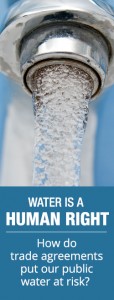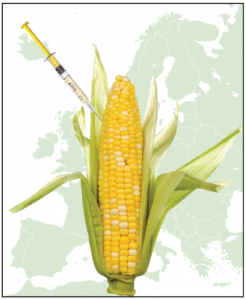Even as we are still resisting the last one, pushed by the European Commission through the Troika (together with the European Central Bank and the International Monetary Fund), we are facing another huge risk from new trade agreements that the EU is negotiating at a multilateral scale. The most important and worrying are the nearly finished Comprehensive Economic and Trade Agreement (CETA) with Canada; the Transatlantic Trade and Investment Partnership (TTIP, also known as TAFTA) with the United States; and the Trade in Services Agreement (TISA), negotiated among 50 countries.
- Where Do These Treaties Stand?
- What Are the Risks for Public Water?
- Market-access Commitments
- Competition, state-owned companies and public procurement
- Investor-state dispute settlement
- Is water on the negotiation table?
- Lessons Learned From CETA
- Conclusion
Where Do These Treaties Stand?
TTIP
The first round of negotiations between the United States and the EU took place in July 2013. The TTIP is not a traditional trade agreement aimed at reducing tariffs on imports. Both sides recognise that the main target is to remove “regulatory barriers”, which would include an attack on social and environmental standards and regulation. Another primary objective is to create new markets by opening up public services and public procurement contracts to competition from transnational corporations.
CETA
The negotiations for a trade agreement between the EU and Canada were launched in 2009, and they concluded in August 2014. The text includes chapters on regulatory co-operation, food and consumer product standards, technical barriers to trade, public procurement, trade in services and investment protection. The agreement still has to go through the approval process by both parties.
TISA
TISA is being negotiated by a self-selected group of 23 governments representing 50 countries, including the United States and the EU. These countries represent more than two thirds of global trade in services. Talks began in 2012, outside of the World Trade Organization (WTO) framework. The negotiations aim to allow foreign corporations the same access to domestic markets at “no less favourable” conditions than domestic companies. At the same time, the agreement could block local governments’ attempts to regulate, purchase and provide services.
What Are the Risks for Public Water?
Trade and investment protection agreements normally do not deal directly with how public administration is organised. But rules for international trade in services can have an impact on organisational autonomy in the area of water supply and sanitation. In this regard, the new wave of trade agreements tries to go further than previous negotiations. Trade agreements are so broad and complex that it is difficult to analyse every possible impact on public water management. Professor Markus Krajewski, from the University of Erlangen-Nuremberg in Germany, explains the risks from the TTIP in a legal opinion for the German Association of Local Utilities. Most of these risks can be applied to the other ongoing free trade negotiations.
Market-access commitments
Market-access commitments aim to prohibit or limit local monopolies, exclusive service suppliers or certain other economic criteria. For example, a law that allows only publicly owned monopolies to provide municipal water and sanitation, and that excludes public-private partnerships (PPPs), could be viewed as a restriction of market access. When negotiating market-access commitments, there are two possibilities. Under the “positive list approach”, all of the services that both parties want to include in the agreement must be listed. This is the EU’s traditional approach, and it would mean that water would be included in the agreement only if it is listed. But the TTIP likely will use a “negative list approach”, as the United States has done since the North American Free Trade Agreement (NAFTA, which came into force in 1994), and which the EU and Canada have used in negotiating CETA. Under this approach, everything that is not listed is affected by the treaty (this is known as “list it or lose it”). There are two annexes where you can list exemptions: Annex I, for measures (laws or administrative practices) that violate obligations of the treaty, and Annex II, to include existing and future measures. One of the most important effects of these trade agreements is that once a sector is liberalised, there is no way back (this is known as the “ratchet mechanism”). Changes are allowed only if they are less restrictive than the measure listed. So, for example, when a country includes a publicly owned local water monopoly as an exemption in Annex I, if a local government decides to privatise it, it will not be able to reverse this decision later. This would block the possibility of re-municipalising the provision of water services, a powerful trend that more than 180 cities have pursued in recent years. To be able to retain regulatory and organisational autonomy, water should be listed in Annex II, as a horizontal exception for public services. But even in that case, the term chosen should capture water supply and sanitation, so that water companies cannot be challenged. The EU normally uses the term “public utilities”. Other terms like “environmental services” include sanitation, but not the supply of drinking water.
Competition, State-owned companies and public procurement
The TTIP also may include chapters on competition and state aid. Some leaked documents show that the EU would like to insert into the agreement provisions on state-owned companies (possible including local companies) and companies with special and exclusive rights. In addition, the EU would like to insert a chapter on public procurement. In line with the General Procurement Agreement negotiated at the WTO in 2012, it is possible that the EU might want to include new areas, such as service concessions or PPPs. As a result of public pressure from the European Citizens’ Initiative on the Human Right to Water, water was excluded from the EU Concessions Directive, on a temporarily basis. If the TTIP creates new obligations, big water companies will lobby strongly to re-insert water back into the directive.
Investor-state dispute settlement
Investor-state dispute settlement (ISDS) is one of the most worrying aspects of this latest wave of trade agreements. Under this mechanism, foreign companies can use private tribunals to sue governments if they deem that their profits or investment potentials are being affected by new laws or changes in policy. ISDS gives companies the power to contest — and potentially reverse — government decisions, and to seek compensation, possibly in the millions of Euros. Around the world, big businesses already have used the ISDS provisions in trade and investment agreements to claim dizzying sums in compensation against democratically enacted laws to protect the public interest. Reports show that European taxpayers have paid more than €3.5 billion to private investors due to similar clauses in previous trade and investment agreements. Argentina, meanwhile, has lost three cases against international investors when the country sought to take back water companies into public hands. Argentina had to pay $105 million to Vivendi (now Veolia) after authorities terminated Vivendi’s contract to supply water to Tucumán province when the company increased water rates by 104% and failed to invest adequately in the system, resulting in low water quality. Argentina also lost a case against Azurix (an Enron subsidiary) and had to pay the company $165 million when a water workers’ co-operative took over drinking and wastewater services in Buenos Aires Province after the company withdrew from the contract. Argentina lost a third case against Suez, AGBAR and Vivendi after the city of Buenos Aires opted to re-municipalise its water company because of concerns about water quality, lack of wastewater treatment and mounting tariffs. At a time when public authorities are increasingly regaining control over previously privatised water services, ISDS presents a serious threat. ISDS is included in CETA, the TISA and the TTIP, and is one of the most controversial chapters. For the TTIP alone, the European Commission received 150,000 replies to a public consultation about ISDS.
Is Water on the Negotiation Table?
Actually, it is impossible for the public to know exactly what is being negotiated in these agreements. CETA negotiations were completely secret, and the text was published only as a final document, in September 2014. The TTIP also is being negotiated behind closed doors, and more than 150 civil society groups on both sides of the Atlantic have denounced its absolute lack of transparency. Even the European Ombudsman has opened a consultation about transparency and public participation in the negotiations. In response to public pressure, the European Commission has announced its commitment to “open the windows”, in a move that is clearly not sufficient to guarantee real civil society engagement and an informed debate. The same secrecy applies to the TISA negotiations. The European Commission’s official position is that, “the EU has no intention of negotiating the right of local governments to provide public services such as the water supply” But in recent years, this official “neutral position” of the European Commission with regard to water management has shown to be not true. The Commission, as part of the Troika, has admitted that it imposes water privatisation conditionalities as part of its “rescue” package to countries affected by the crisis. Moreover, in its response to the European Citizens’ Initiative on the Human Right to Water, which collected nearly 2 million signatures across Europe, the European Commission lost an important opportunity to explicitly exclude water from the TTIP negotiations. Based on a preliminary version of the TTIP services offer from the EU, which was leaked in June 2014, drinking water services seem to be excluded, although sanitation and other water services remain within the scope of the agreement. The European Commission continues to deny that public services are on the table, but the lack of transparency and the experiences with other trade agreements are not reassuring. Moreover, analysis from trade unions shows that the existing public service exemptions in previous trade agreements have limitations, particularly in their scope and level of protection. This is in part because of the lack of legal and conceptual clarity, but also because the agreements do not seem to be flexible enough to accommodate changing political and social approaches towards public services. In general, the existing provisions do not offer public services a sufficient level of protection from the impact of the obligations of trade agreements.
Lessons Learned From CETA
During early negotiations for CETA, leaked texts showed that the EU wanted the treaty to cover all water services, including drinking water, as it had done in previous trade negotiations. In another leaked document, Canada’s offer showed that water services were not excluded from the negotiations. The final text of the agreement, leaked in August by a German TV station and analysed by the Canadian Centre for Policy Alternatives, explicitly exempts water resources from CETA. With limited exceptions, however, the agreement treats water like any other tradable good, and the delivery of water like any other commercial service. After consider¬able public pressure to exclude water services from the agreement, Canada and the EU have taken broad Annex II reservations for market access and na¬tional treatment obligations with respect to the collection, purification and distribution of water. In practice, this means that Canadian and EU governments, including municipalities, are free to privatise or partially privatise public water systems as they see fit. But they are less free to re-municipalise those private services in the future if service levels are inadequate or if the private service becomes too expensive. The market-access reservation would give governments the ability to re-instate public monop¬olies, but investors have new rights to challenge the same decision through private investment tribunals. Another threat to public water comes from CETA’s procurement chapter. The commitments as they appear in the leaked text are confusing and ambiguous, but on the Canadian side, the Canadian Centre for Policy Alternatives contends that at least some water services by local governments and utilities are covered. This will likely give private water compan¬ies a “foot in the door” to establish and expand the private delivery of what should be a universal right: affordable, publicly delivered water and sanitation services.
Conclusion
The experience with CETA shows that despite politicians denying it, water was on the negotiation table. It also proves that broad public mobilisation can stop the worst impacts of such an agreement. But even when civil society manages to keep sensitive sectors like water out of an agreement, it is extremely hard to block all the possible damage that such treaties can mean for a model of public and democratic water management. With CETA in the process of being approved (or not) and the TTIP and the TISA under negotiation, this new wave of trade agreements represents a major threat to many of the victories that civil society has achieved in the last few decades. Keeping and recovering public water management and making the human right to water a reality are key reasons to campaign against these free trade agreements.
Get the endnotes with the .pdf.
DOWNLOAD PDF VIEW ON SCRIBD




